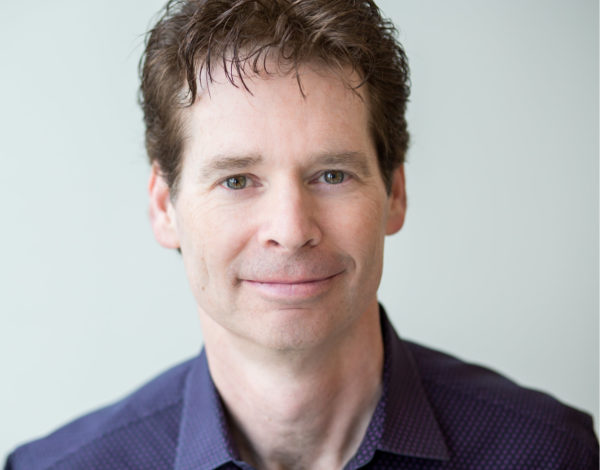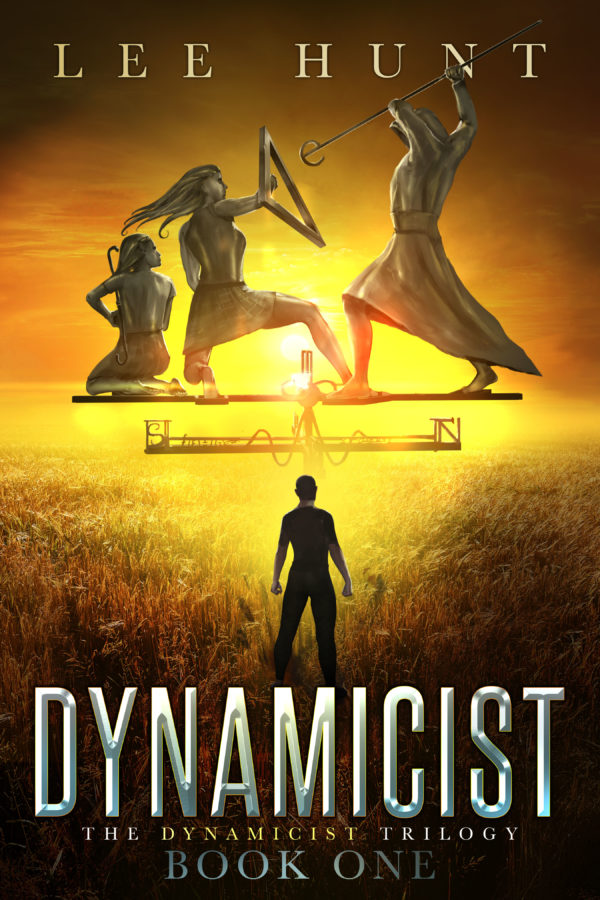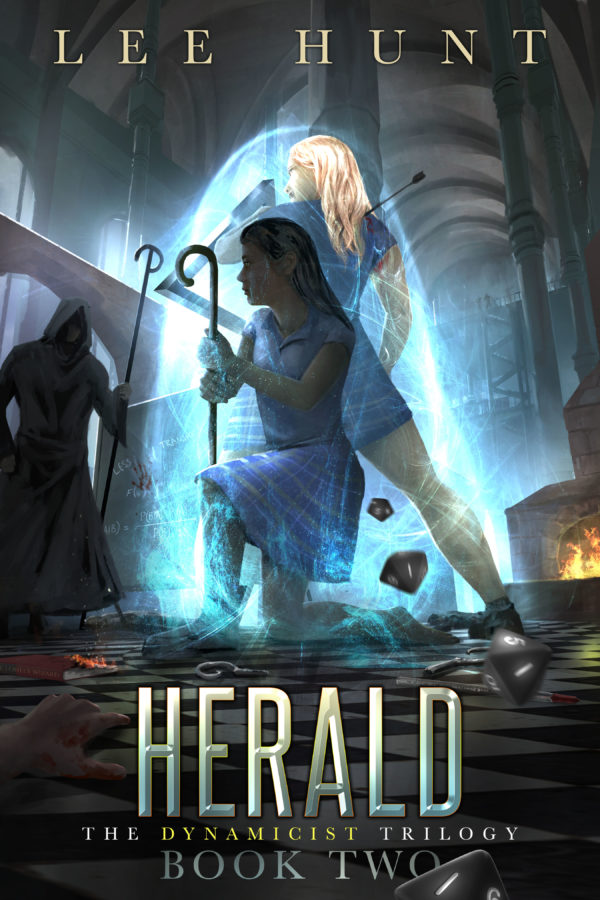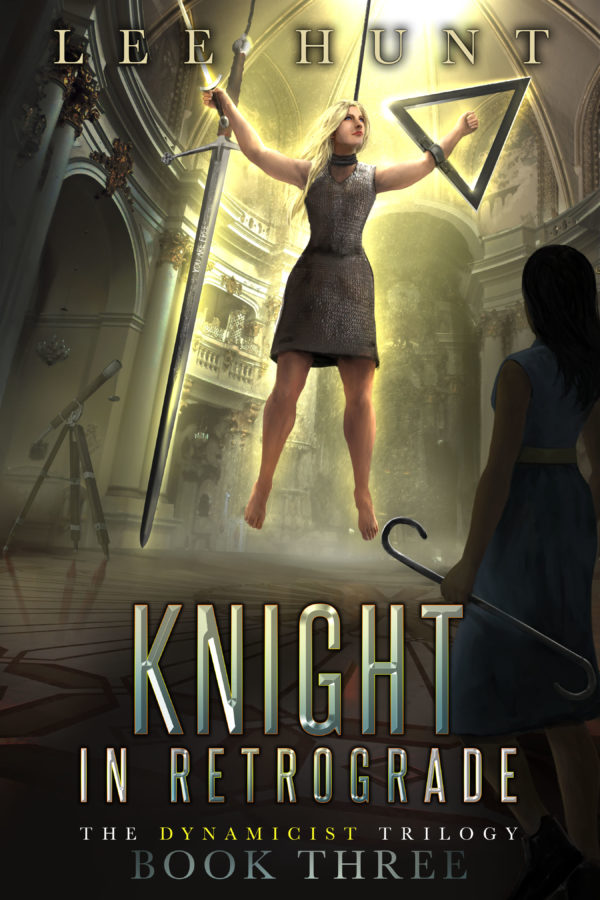Welcome to my weekly Author Spotlight. I’ve asked a bunch of my author friends to answer a set of interview questions, and to share their latest work.
Today, Lee Hunt – Ever try to do things you were really not well suited to? Lee Hunt understands. He was born on a farm with only one working lung, but has gone on to be an Ironman triathlete, a sport rock climber, and a professional geophysicist. The poor lung function has been an excellent excuse for his unimpressive triathlon performance—he is among the worst of those able to complete the Ironman under his own power—and is of some service in eliciting a modicum of sympathy for his average at-best skills as a climber. Actually no one on a rock wall really cares about excuses.
His breathing problems are useless in explaining his career as an applied scientist. He was actually not bad at that. Lee published close to fifty papers, articles or expanded abstracts, has been awarded numerous technical awards, and was the CSEG’s Distinguished Lecturer in 2012. He enjoys discussing the amorality of science and is useful at parties in explaining the physics of whether fracture stimulation might be a risk to the fuzzy cuddly things of nature.
If you want to hang out with Lee, look for him hiking, cycling, floundering in a lake, clinging desperately to a wall, or at his desk trying to write an entertaining story.
Thanks so much, Lee, for joining me!
J. Scott Coatsworth: If you could sit down with one other writer, living or dead, who would you choose, and what would you ask them?
Lee Hunt: Joseph Conrad. The loneliness of his existential worldview was always a point of great fascination for me. I would ask him if he thought we really all dream alone, if he thought that on the day he was married, and if he felt that way as his life came to a close.
JSC: How would you describe your writing style/genre?
LH: I write a realistic and adult style of fantasy. The magic systems I write are very realistic, and I use them to help deliver the thematic message of the story. My writing strives to be fun, but I cannot write about characters or things that don’t matter to me, so my stories always center upon ideas and conflicts that I feel are real.
JSC: Have you ever taken a trip to research a story? Tell me about it.
LH: My entire career as a geophysicist was a trip I took to research my stories. One of the memorable lessons from field school was when we detonated a tiny (1/8 pound) of dynamite on the surface from a distance of over 100m. The explosion hurt, and hurt badly. It was like an electric shock of percussive pain. That is what a near instantaneous wave with frequencies from 1 to 10,000Hz feels like. Unlike in a movie explosion, one cannot turn their back on that kind of sharp pain. Just walking straight into Mordor would be easier. The real lessons of physics and earth physics, of the limitations of science, of mistakes made, the shattered glory that experimenter’s bias buys when reality comes home to roost, and the pitiful accuracy of predictions … well, all those things I learned were one big research trip.
JSC: Do you ever base your characters on real people? If so, what are the pitfalls you’ve run into doing so?
LH: All the knights damned time. Real people and all their foibles, moments of foolishness and beauty, those are the models for great fictional characters. The best and the worst show up more often though. That and the great errors the mob makes.
JSC: What do you do if you get a brilliant idea at a bad time?
LH: There is no bad time to get a good idea. Is this a trick? If so, I want more like it, and more brilliant ideas. In any case, I either stop what I am doing, whatever it may be, and write the idea down or make a voice memo for it on my phone.
JSC: Are there underrepresented groups or ideas featured if your book? If so, discuss them.
LH: Underrepresented people are getting more coverage now, which is great and should continue, but ideas … I feel like the notions of complexity and cost (think thermodynamic limitations) get overlooked in favor of magic bullets. We like to paint our bad guys too simply, our solutions as simple, regardless of political tilt. This kind of reductive thinking can be fun, but my life experience makes me reject happy simplicity and simple bad guys. I want to write stories that acknowledge and go somewhere with the real difficulty of things, and the possibility that we are both hero and villain.
JSC: Are you a plotter or a pantster?
LH: I try not to call myself names or paint myself into corners, so I would say neither. I do lay out a very complicated spreadsheet with plot tabs, character tabs, thematic tabs, poems, history, physics and magic system notes. I do those organizational things, but I also let ideas run away if it seems like they may go someplace interesting. I’ve flipped a coin on gender more than once, then made adjustments to the character. I do ask myself these questions at various times, “Is this original? Is this interesting? Have I put myself into this situation deeply enough and twisted it?” Those questions sometimes stop me from following the spreadsheet and take a step to the side.
But one thing I always do early is make sure I have a good idea of what I want to say and how the story should end.
JSC: What’s the funniest or creepiest thing you’ve come across while researching for one of your stories?
LH: I know the temperature at which human blood coagulates. It is not particularly high.
JSC: What character gave you fits and fought against you? Did that character cause trouble because you weren’t listening and missed something important about them?
LH: Koria Valcourt was hard to write in Knight in Retrograde (KIR) when she became a POV character. The problem with Koria is that she is incredibly intelligent and emotionally stable. She is not the kind of person to get upset (no matter how bad the situation) and do anything silly. She would not waste time, emote, throw things, drink herself silly. She was tough. She had this awful thing happen to her near the beginning of KIR, and her reaction to it was very internal and very controlled. To some readers, her behavior seems unbelievable. But Koria is too much of a woman, too controlled to act in the way most people expect. And I needed to write her in this way. She needed to be different. It helps that I have met a few extraordinary women, who, like Koria, have survived awful things, so I had some models. But she was different, and I had to write her reactions differently.
JSC: What fictional speculative fiction character would you like to spend an evening with, and why?
LH: The Lonely Wizard from my trilogy. He is this super intelligent, but emotionally closed person. He believes love may not exist because it cannot be quantified. And yet he travels to help his mother. He denies love, but still needs it, and so he is doomed. I would love to talk with him. He has so many great ideas and such an awful hole in his soul. Both are fascinating. I have been chatting with a friend I know who identifies with him. She does not have a hole in her soul, but she relates to some of his feelings on love and relationships. And I so enjoy speaking with her about these subjects.
And now for Lee’s Dynamicist Trilogy:
Would it kill you to create something genuinely new? In Robert’s world, it used to. Supernatural vengeance for invention is now a thing of the past.
Young, optimistic, quick of mind and quick to act, Robert thinks being invited to the New School is an invitation to change the world. But change is difficult when there is no history of innovation.
He is initially successful in his studies, but nothing is as simple as he naively imagines. His classmates confuse and frustrate him. One is a drunk, while another two constantly stalk him. Is it for love or something more sinister?
Robert’s optimism is further tested by protestors who circle the campus, decrying the newly invented breed of grain. They claim it is poison and that the New School should be punished by Nimrheal, the god who formerly murdered inventors. Robert suspects foreign business influences are behind the protests, but he quickly finds that investigating their cause is dangerous.
Robert’s most difficult challenges are his unresolved childhood issues. His mother died while he was a child. Robert’s formative helplessness and inability to remember her face projects into a powerful and blinding protectiveness towards all women. When a campus assault pushes Robert over the edge, his hopes of even staying at the New School are jeopardized. He cannot aspire to change the world if he does not even know himself.
At the same time as Robert struggles on campus, a powerful, ruthless and emotionally closed man known only as the Lonely Wizard journeys across an empty wilderness to return home. As Robert and the Lonely Wizard move closer together, Robert finds that instead of entering a golden era of invention, he may instead be on the brink of a cold war and an endless, unchanging dark age.
Dynamicist (Book 1)
Amazon Audiobook | Amazon US | Amazon UK | Amazon CAN | B&N | Kobo | Liminal Fiction
Herald (Book 2)
Amazon Audiobook | Amazon US | Amazon UK | Amazon CAN | B&N | Kobo | Liminal Fiction
Knight in Retrograde (Book 3)
Amazon US | Amazon UK | Amazon CAN | B&N | Kobo | Liminal Fiction
Excerpt From Herald
“How did we enjoy that lesson, class?” Gerveault seemed amused.
Everyone had managed to make some ice, but the sizes and quality varied. Gregory’s efforts seemed to yield the poorest results. But he did not consider his friend’s efforts a failure. Gregory—and everyone else in the class—had achieved the greater breakdown.
“Can we burn something next?” asked Eloise with a gleam in her eye. She clearly took a fierce joy in changing things. Especially destructively.
“Like the Lonely Wizard!” exclaimed Heylor.
Gerveault frowned. “Most definitely not, Miss Kyre. And there will be no lonely wizards here, Mr. Style, only dynamicists. We are moving on to the other half of today’s objective, which is all about accuracy. The scale experiment you just participated in should have taught you two things. First that scale is not as important as you might have thought. Thermodynamic losses are not linear with size. There is a large component of loss simply in the breakdowns themselves. Second, by playing at the larger end of the scale of things, a few of you also demonstrated to yourselves that the nature of the error field and the nature of your transformational mathematics are inextricably bound together. In an exercise where accuracy is critical, this must be given the highest consideration.” He paused and gestured towards Koria. “Lady Koria Valcourt will now take you through an exercise that you must pass before progressing further in dynamics: baking a cake.”
Davyn’s hand shot up. “I like cake!”
“What a surprise,” whispered Bethyn to laughter from Deleske.
Endicott’s vision focused and he leaned forward, ready to take in everything Koria had to say about cake. She held up a small piece of paper. “This is a recipe for cake. A simple white cake to be precise.”
Davyn’s beefy hand shot up. “What about the icing? Is icing included?”
Koria scowled. “We are not concerned with the icing.”
“I like a whipped-cream icing,” Eloise hollered.
“I bet you do,” said Bethyn sarcastically.
Eloise turned towards Bethyn and looked ready to turn their cold animosity hot, but Davyn interrupted, shouting, “Everyone likes whipped cream!”
Koria shook her head in exasperation. “You can make whipped cream after you bake the cake. Now focus. There are alloyed cake molds in the kitchen with well-known thermal properties. What you are going to do is this: mix up the cake batter in the normal way but use dynamics to bake the cake. If you can bake the cake so that it is cooked consistently, but not burned, then you will have passed the test.”
“And eat it?” boomed Davyn.
Koria nodded. “Being good enough to eat is mandatory.”
Endicott stared at the cake pan and considered the problem of baking the thing. He grasped a few of the relevant facts but not all of them. The cake recipe called for baking at one hundred and seventy-seven degrees for thirty minutes but specified a final internal temperature of ninety-nine degrees. He saw at once that there were five key issues.
First baking a cake by dynamics was an internal rather than an external operation, so he had to focus on the internal temperature. This was no problem, but the time at that internal temperature was undefined. Second all the dynamics he had executed so far, except for probability dynamics, had been virtually instantaneous. Third he did not know the thermal capacity of the cake batter. Fourth the cake was small, so he had to consider the error field carefully. Fifth he did not know what transformational mathematics he should use.
But perhaps he could get started on the task without defining the entire solution. The thermal capacity question was the simplest starting point. He made a large amount of batter and poured it into three different but familiar vessels, then produced three cups of water of the same size and temperature. He readied six thermometers and used the three different amounts of batter as heat sinks while attempting to lower the water temperature by five degrees in each cup. By measuring the temperature of the three batter samples after each innovation, he could make an estimate of the batter’s thermal capacity.
Interestingly the cake batter’s thermal capacity was barely half that of water.
Endicott tapped his feather pen against his nose a few times, considering the problem.
It’s just cake.
I will learn a lot if I just try something.
He decided to try an instantaneous manipulation to take the batter temperature up just a few degrees past ninety-nine and then let it cook while it cooled. He chose the tight level of support he had been using and the Lessingham transform. Calculations made, he announced, “Innovating.”
His cake exploded, spraying the classroom with bits of half cooked, scalding batter. Cries of surprise and pain filled the workroom.
Again?
Eloise was no mind reader, but she knew Endicott well enough to anticipate his intentions. “Again? Do you even know what you did wrong the first time, stupe!” she shouted, scooping a clod of batter out of her hair. Bethyn, Deleske, Gregory, Davyn, and Heylor were similarly soiled with variably cooked cake mix. Only Koria, safe at the front of the room, was unscathed.
He thought he might know what he had done wrong, but explaining it to an enraged Eloise did little good. Later, as he cleaned the bowls of raw batter out of his own hair—deposited there by Eloise, assisted by the rest of his classmates— he thought about his error. Eloise had shouted, “Are you learning anything? Are you learning?” as she poured the batter on his head while the others held him down. Koria had not intervened. She had only shaken her head and said gravely, but through a smile, “Lessons must be learned. That is what we are here for, after all.”




